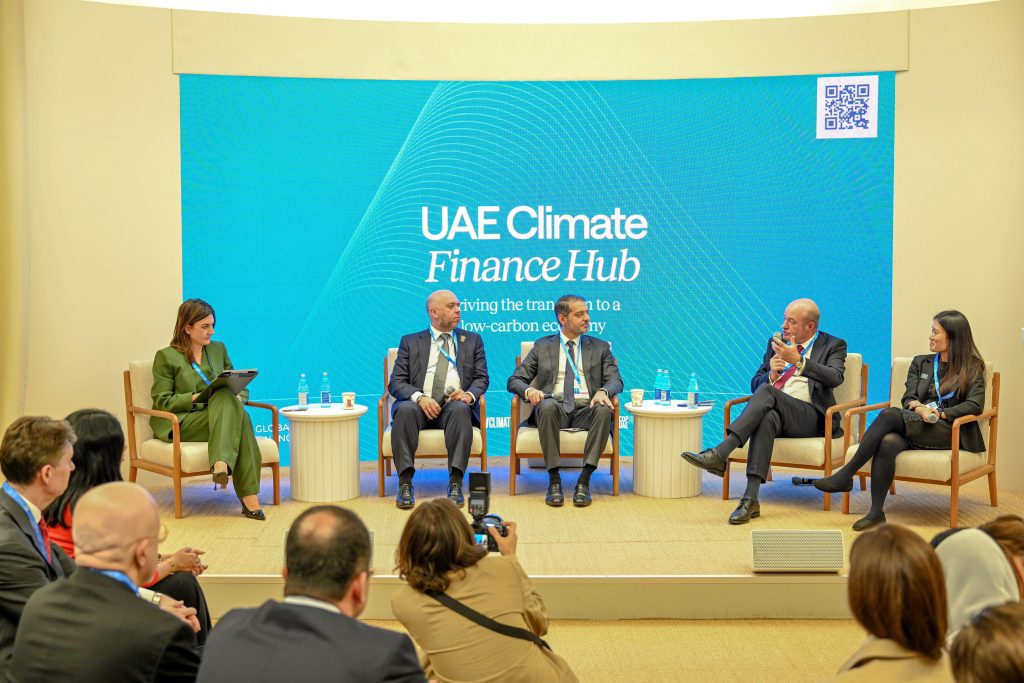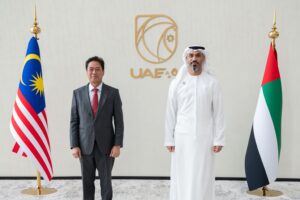UAE Pavilion at COP29 Hosts Key Sessions on Climate Finance to Accelerate Global Transition

Baku, The Gulf Observer: At COP29, the UAE Pavilion hosted eight dynamic sessions on Thursday focused on ‘Climate Finance’, addressing strategies to accelerate the global transition toward a net-zero and climate-resilient future. The sessions featured a diverse group of UAE climate action leaders and partners, including the Global Climate Finance Centre (GCFC), clean energy company Masdar, its WiSER programme for women in sustainable change, HSBC, the Global Islamic Finance Programme, and the Mohamed bin Rashid School of Government.
The Mobilising Climate Finance for the Global South session, moderated by Shaima Gargash, Director of Energy and Sustainability at the UAE Ministry of Foreign Affairs, alongside Mercedes Vela Monserrate, CEO of the Global Climate Finance Centre, explored the importance of South-South collaboration, especially in Africa. The discussion focused on how green initiatives in Africa are bringing real climate solutions through “bankable projects” that align policy with investment, fostering sustainable growth.
A key highlight, the Global Climate Finance Framework session, featured Majid Al Suwaidi, CEO of ALTÉRRA and COP28 Director-General. Al Suwaidi highlighted how ALTÉRRA has committed $5 billion in catalytic capital for the Global South, stressing that the path from billions to trillions in climate finance can only be achieved when the financial community and private sector engage deeply in relevant conversations. His remarks underscored the critical role of financial frameworks in meeting the climate finance needs and accelerating investment for global economic growth.
In the UAE as a Climate Finance Hub session, Al Suwaidi presented the UAE’s growing financial ecosystem for climate technology, showcasing partnerships with financial institutions and innovators in climate-tech. Discussions included the role of Green Bonds and Renewable Energy Financing, with Bruce Johnson, Director of Corporate Finance and Treasury at Masdar, explaining how Masdar’s green bonds fund renewable energy projects, reinforcing the UAE’s position as a leader in sustainable energy.
The UAE/Climate Changemaker Majlis with WiSER, facilitated by Amy Brachio, EY’s Global Vice Chair for Sustainability, provided an open platform to discuss how innovative climate finance solutions can be made equitable. Reem Al Mussabeh, Serial Tech Entrepreneur and WiSER Pioneer, emphasized the importance of mentorship, capacity building, and awareness in driving impactful climate solutions, particularly for marginalized groups.
HSBC and global thought leaders also discussed socially inclusive transitions, focusing on Financing the Just Transition Across the Global South. Meanwhile, the Global Islamic Finance Programme for Climate, Nature, and Development examined the role of blended finance in unlocking the $3 trillion global Islamic finance asset pool. Additionally, the session on Policy and Finance in Bridging the Adaptation Gap in MENA explored how to strengthen resilience and access to climate finance in the Middle East and North Africa, with contributions from the Mohamed bin Rashid School of Government and HSBC.
These sessions reaffirmed the UAE’s leadership in global climate finance and its pivotal role in supporting the global transition to a sustainable, climate-resilient future.


